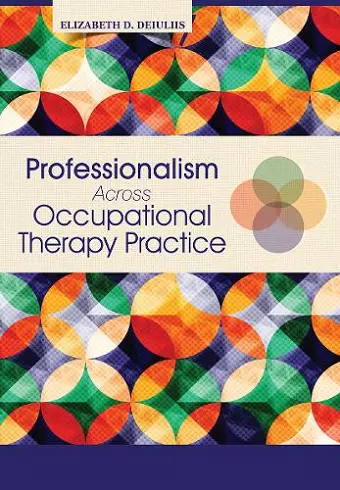Professionalism Across Occupational Therapy Practice
Format:Paperback
Publisher:SLACK Incorporated
Published:17th Apr '17
Should be back in stock very soon

When most people think of professionalism, ethics, or moralism, they often think of a set of rules for distinguishing between right and wrong, such as the proverbial Golden Rule. However, the true definition of professionalism is not an easy one, and it is not necessarily black and white. In fact, it could be argued that it is often easier to describe what is not professional versus what is professional. It could also be disputed that although professionalism can be recognized when you see it, you may not necessarily be able to put your finger on what “it” is exactly.
Professionalism Across Occupational Therapy Practice by Dr. Elizabeth D. DeIuliis provides an overview of the wide-ranging knowledge, skills, and attitudes that encompass professionalism across the occupational therapy profession. While there is no formal endorsed definition of professionalism in occupational therapy practice, suggestions are provided to serve as a blueprint for use.
“Professionalism in occupational therapy practice is a dynamic sophistication, exemplified by a combination of an individual’s personal skill set, knowledge, behaviors, and attitudes, and the adoption of the moral and ethical values of the profession and society.”
Dr. DeIuliis illustrates the concept of professionalism as a unique combination of intrinsic and extrinsic qualities surrounding key constructs of ethics, responsibility, competency and behavior. Professionalism Across Occupational Therapy Practice discusses these various expectations in the academic setting, the clinic, workplace, and in general society.
Professionalism Across Occupational Therapy Practice utilizes a developmental approach to teaching and learning, paralleling the Revised Bloom’s Taxonomy (2001). This classification system provides a graded, holistic methodology to human teaching and learning. The concept of professionalism will be exemplified by using both a knowledge-based approach to subject matter requiring higher-level learning such as metacognition, which is a crucial component of professionalism. The chapter objectives and learning activities will challenge the reader to recall, comprehend, apply analysis, synthesize, evaluate, and create knowledge directly to their context.
Instructors in educational settings can visit www.efacultylounge.com for additional materials such as informative appendices and resources include sample statements for syllabi & policy manuals, resume and CV templates, interview guidelines, professional development plans and more to be used for teaching in the classroom.
Occupational Therapy practitioners at all levels,...
"This would be a valuable addition to any occupational therapy program. It is succinct and easy to read. Students will enjoy the pictures and the summary boxes that reinforce important concepts. Since reviewing this book, I have recommended that our occupational therapy program look at adopting it for several occupational therapy courses." -- Cristy Daniel, EdD, OT, Doody's Review Services
“The writing style of the author is succinct and to the point. This is especially beneficial for students, as there is no room for ambiguity in the interpretation of examples of professionalism (including dress code and use of social media/electronic devices) provided in the text. Facts in the book are heavily referenced and opinions are clearly identified and stated. This book provides a useful roadmap for students, educators, and practitioners to further professionalism in occupational therapy." -Charles Shadle, OTD, OTR/L, Occupational Therapy in Health Care
“This text is a practical tool for use in training occupational therapy students. The 15 chapters and 345 pages are written in a dynamic style that will hold the reader’s attention.” -Alexandra Lecours, PhD, Canadian Journal of Occupational Therapy
ISBN: 9781630910914
Dimensions: unknown
Weight: 639g
364 pages